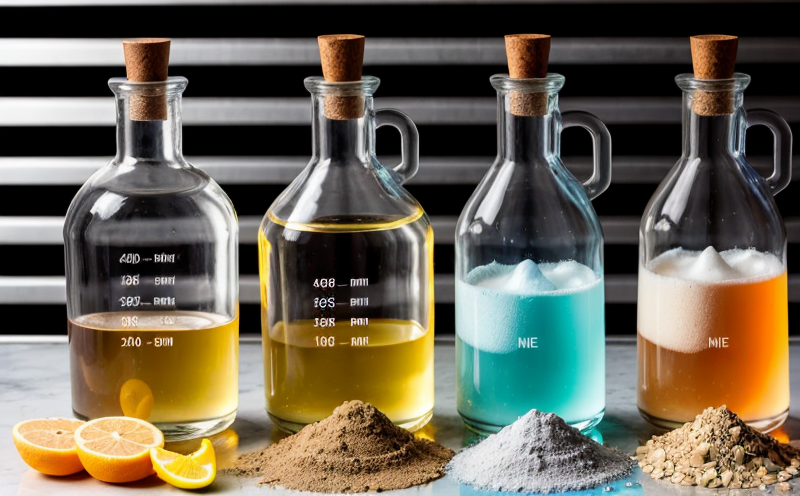ISO 18243 Chemical and Electrolyte Testing of Lithium-Ion Batteries for Light EVs
The ISO 18243 standard provides a comprehensive framework for the chemical analysis and electrolyte testing of lithium-ion batteries used in light electric vehicles (EVs). This service is essential for ensuring that battery components meet stringent quality control benchmarks, thereby enhancing safety, performance, and reliability. Lithium-ion batteries are the cornerstone of modern EV technology due to their high energy density, long cycle life, and relatively low self-discharge rate.
The testing procedure outlined in ISO 18243 involves a series of meticulous steps designed to ensure that the electrolyte composition is within specified parameters. This includes assessing the concentration of key components such as lithium salts (e.g., LiPF6), solvents, and additives. The electrolyte plays a critical role in facilitating ion transport between the cathode and anode, which directly impacts battery efficiency and longevity.
In addition to electrolyte composition analysis, the standard also specifies tests for impurity levels. Impurities such as trace metals (e.g., iron, copper) can have detrimental effects on battery performance by promoting corrosion or causing short circuits. The presence of these contaminants is rigorously monitored through advanced analytical techniques like inductively coupled plasma optical emission spectrometry (ICPOES).
Furthermore, the test protocol encompasses evaluation of thermal stability and electrical conductivity. Thermal stability ensures that the electrolyte can withstand extreme temperature fluctuations without decomposing or losing its functional properties. Electrical conductivity assessments measure how efficiently ions move through the electrolyte solution, which is crucial for optimal battery performance.
The process begins with thorough sample preparation, where small quantities of battery cells are extracted and processed to obtain a homogeneous electrolyte solution. Once prepared, this solution undergoes rigorous analysis using state-of-the-art laboratory equipment such as high-performance liquid chromatography (HPLC) and atomic absorption spectrometry (AAS).
The results from these analyses provide critical insights into the battery's internal chemistry, enabling quality control teams to make informed decisions regarding material procurement and manufacturing processes. By adhering strictly to ISO 18243 guidelines, manufacturers can ensure compliance with international standards while maintaining a high level of product quality.
- Ensures Compliance: Adherence to international standards ensures that the batteries meet safety regulations and performance expectations.
- Promotes Safety: Rigorous testing minimizes risks associated with lithium-ion batteries, enhancing overall vehicle safety.
- Improves Efficiency: Accurate electrolyte composition analysis leads to more efficient battery operation, reducing energy losses.
- Enhances Reliability: By identifying and addressing potential issues early in the manufacturing process, reliability is significantly improved throughout the battery's lifecycle.
In conclusion, ISO 18243 chemical and electrolyte testing of lithium-ion batteries for light EVs is a vital component of modern automotive quality assurance. It not only guarantees compliance with international standards but also enhances safety, efficiency, and reliability—key factors in the success of electric vehicles.
Applied Standards
The ISO 18243 standard for chemical and electrolyte testing of lithium-ion batteries is widely recognized and adopted across the automotive industry. It aligns with other international standards such as ASTM D7091, which provides additional guidelines for battery testing in the United States. These standards ensure that all parties involved—from manufacturers to regulators—are working towards consistent quality benchmarks.
The ISO 18243 standard emphasizes the importance of precise and reproducible test methods. It specifies detailed procedures for sample preparation, instrumentation calibration, and data interpretation. This ensures that results are accurate and reliable, regardless of where or by whom they are conducted. The use of standardized protocols also facilitates comparability between different laboratories, which is essential in an industry where global collaboration and consistency are paramount.
For those involved in the development and production of lithium-ion batteries for light EVs, understanding these standards can significantly enhance their ability to innovate and compete effectively in the market. By staying aligned with international best practices, companies demonstrate a commitment to excellence that can build trust among customers and stakeholders alike.
Scope and Methodology
The scope of ISO 18243 chemical and electrolyte testing encompasses several key areas pertinent to the analysis of lithium-ion batteries used in light electric vehicles. This includes not only the chemical composition but also the physical properties that influence battery performance.
Chemical Analysis:
- Determination of LiPF6 concentration
- Solvent identification and quantification
- Additive content assessment
- Impurity level evaluation (trace metals)
Physical Properties Evaluation:
- Thermal stability testing
- Electrical conductivity measurement
- Battery cell compatibility verification
The methodology employed in this service involves a multi-step approach that begins with careful sample collection and preparation. Samples are extracted from batteries under controlled conditions to ensure they represent the true nature of the electrolyte solution. Once collected, these samples undergo various analytical procedures using advanced laboratory instruments.
For chemical analysis, techniques such as HPLC and AAS play crucial roles in determining the presence and concentration of specific compounds. These methods provide highly accurate data that form the basis for further evaluation. Thermal stability tests involve subjecting the electrolyte to controlled heating environments to observe any changes over time. Conductivity measurements are conducted using specialized equipment designed to detect even minute variations in ion movement.
The entire process is meticulously documented and reported according to ISO 18243 requirements. This ensures that all findings can be easily traced back to their sources, providing a transparent audit trail for regulatory bodies and internal quality assurance teams.





